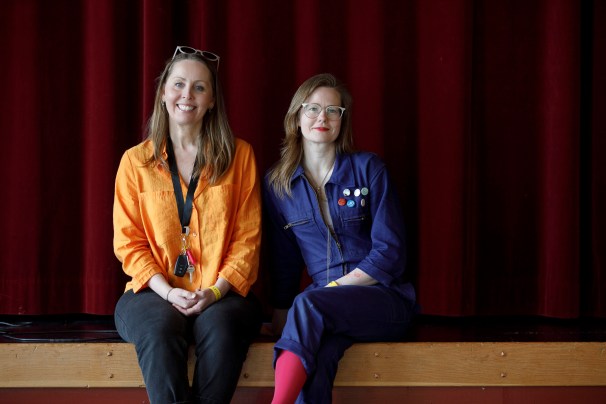The documentary film festival brings new stories and well-loved traditions to Patreksfjörður
It’s hard to explain the charm of Skjaldborg Documentary Film Festival for someone who’s never taken that winding road to Patreksfjörður on the Whitsun weekend. Sure, it focuses on documentary cinema — the name gives that away — but Skjaldborg is so much more than that. It lives in the quirky traditions that come with it: the cosy red-seated cinema, the annual plokkfiskur party in the community hall, the parade that snakes through town with unexpected pomp, and the infamous limbo competition that always seems to go on just a little too long. Maybe it’s the place. Maybe it’s the people. Maybe it’s something in the salty air of Patreksfjörður, or it’s the midsummer sun that keeps the festival alive long past bedtime. But whether you’re young or old, whether you care about documentaries or not, Skjaldborg has a way of getting under your skin.
This year, as Reykjavík sank into a rare mid-May heatwave, I found a patch of grass on Austurvöllur with Skjaldborg’s organisers, Kristín Andrea Þórðardóttir and Karna Sigurðardóttir, to hear what the 18th edition of the festival has in store.
A taste of the programme
“There’s definitely a strong theme,” Karna says of the programming. “This seems to happen every year without us really controlling it. There are some rebellious spirits — people fighting against the system, questioning the system and finding their own ways.”
This theme extends to the festival’s diverse programme, which features 13 Icelandic premieres — five features and eight shorts. Karna and Kristín Andreawon’t play favourites, but here’s a taste of what’s on the way: Tight Lines by Gagga Jónsdóttir, trails four teenage girls learning to become angling guides on the banks of Laxá, Iceland’s biggest salmon river, as they grapple with the uncertain future of both the river and their family business. The Farmer and The Factory, directed by Barði Guðmundsson and Hrafnhildur Gunnarsdóttir, follows a farmer trying to understand, and get justice for, her horses falling ill due to fluoride pollution from a nearby factory.
Then there’s Amateur’s Paradise by Janus Bragi Jakobsson, following four men across generations who’ve documented their lives on YouTube. Using their own footage, the film plays with the line between memory and performance as they reflect on what really matters.
On the shorter end of the programme: Memory Man by Erlendur Sveinsson — a 12-minute piece that was first shown in last year’s Work in Progress section — captures the human behind one of Iceland’s last surviving video labs. Paranormal Iceland: The Refuge in the Wasteland by Gunnjón Gestsson, meanwhile, takes a walk through the country’s most haunted house.
In addition, the Skjaldborg team is bringing to the festival what Karna calls “unseen gems” — a newly restored film made from archival footage by Patreksfjörður resident Garðar Ó. Jóhannesson, who documented daily life of the town between 1948 and 1953. The footage, recently restored by the National Archives of Iceland, has never been shown before.
“We always love to bring tiny little presents for the people of Patreksfjörður,” says Kristín Andrea.
The festival’s guest of honour is Italian director Alessandra Celesia, who brings two documentaries to Skjaldborg — as Kristín Andrea puts it, “beautifully done, very intimate,” sister films The Bookseller of Belfast and The Flats, the latter revisiting one of the characters from the former a decade later. Together, the films weave through themes of generational trauma and life under occupation.
“We always love to bring tiny little presents for the people of Patreksfjörður.”
Kristín and Karna also highlight the festival’s off-venue at Skriða, an independent publisher in town, where an installation excerpt from the upcoming documentary series The Mushroom Kingdom by Anna Þóra Steinþórsdóttir and Erna Kanema Mashinkila will screen on opening night. Fungi are truly having a moment — this homegrown series comes just a year after the internationally acclaimed Fungi: Web of Life, narrated by Björk. The score for The Mushroom Kingdom was composed by Sin Fang, who used mushrooms’ electric impulses to make the music. The docuseries will be shown on RÚV this autumn.
And then, of course, there are the afterparties — with DJ Silja Glømmi, Inspector Spacetime and a band that only Skjaldborg regulars will know by name. “The Shits are having a comeback!,” Karna grins with a smile. “Nobody can miss that.”
The magic is real
In 2025, Skjaldborg will also pay tribute to film critic and poet Ásgeir Ingólfsson, who passed away earlier this year and is deeply missed by the local film community. The festival will be selling his poetry books, with proceeds going to a memorial fund aimed at preserving his work. Ásgeir was a festival fixture, known for writing daily reviews during Skjaldborg. This year, a line from one of his articles will be printed on the festival’s annual tote bag: “Moments don’t get more magical than this.”
What Ásgeir meant by magical moments were, of course, the little rituals and quirks that make Skjaldborg unlike any other film festival: the fish dinners, the whole town packed into Skjaldborgarbíó, the sea breeze as you walk to your hotel or tent after a late-night screening.
It’s those kinds of details that give Skjaldborg a reputation that extends far beyond Patreksfjörður.
“When people say ‘Skjaldborg,’ they get stars in their eyes,” says Karna, summing it all up. “It really doesn’t matter who you talk to. People are interested in coming to Patreksfjörður, even if they’re not connected to filmmaking, nor interested in documentaries. It becomes interesting to everyone. First, just being in this place. And then, these stories, they’re about being a human in this complex world. It’s intimate. People connect to it.”
Skjaldborg runs from June 6 to 9. For full programme and info visit: skjaldborg.is

